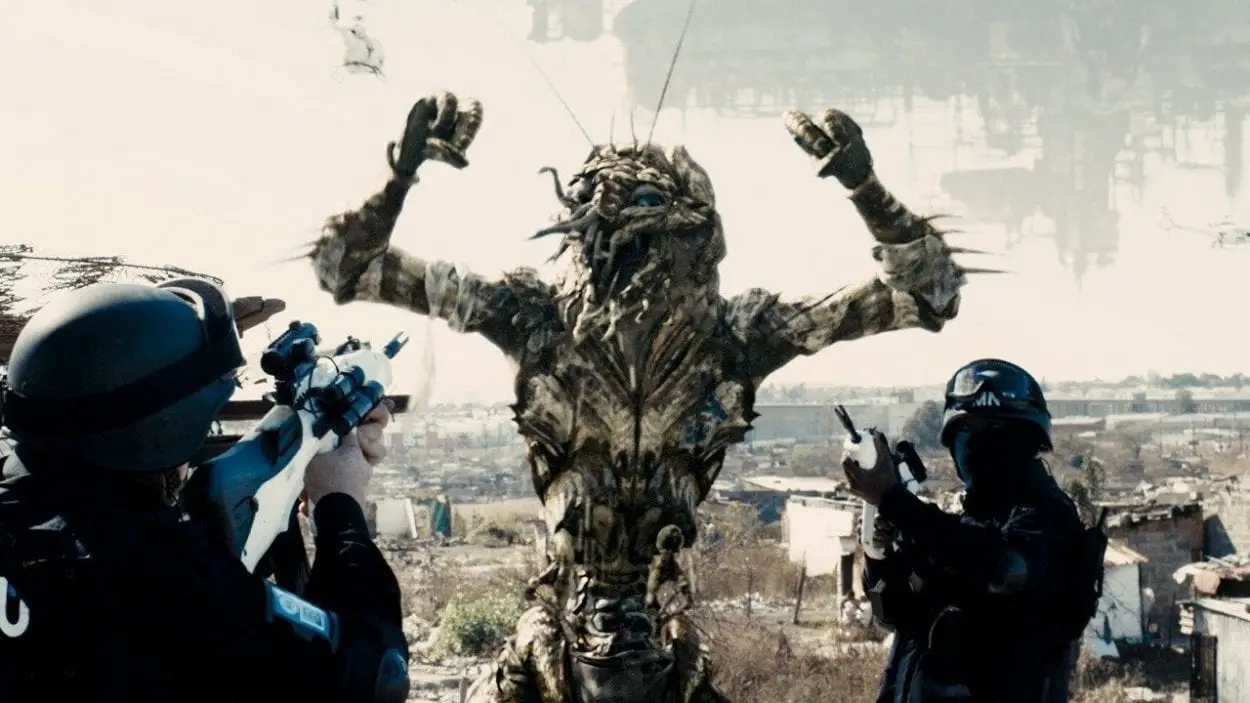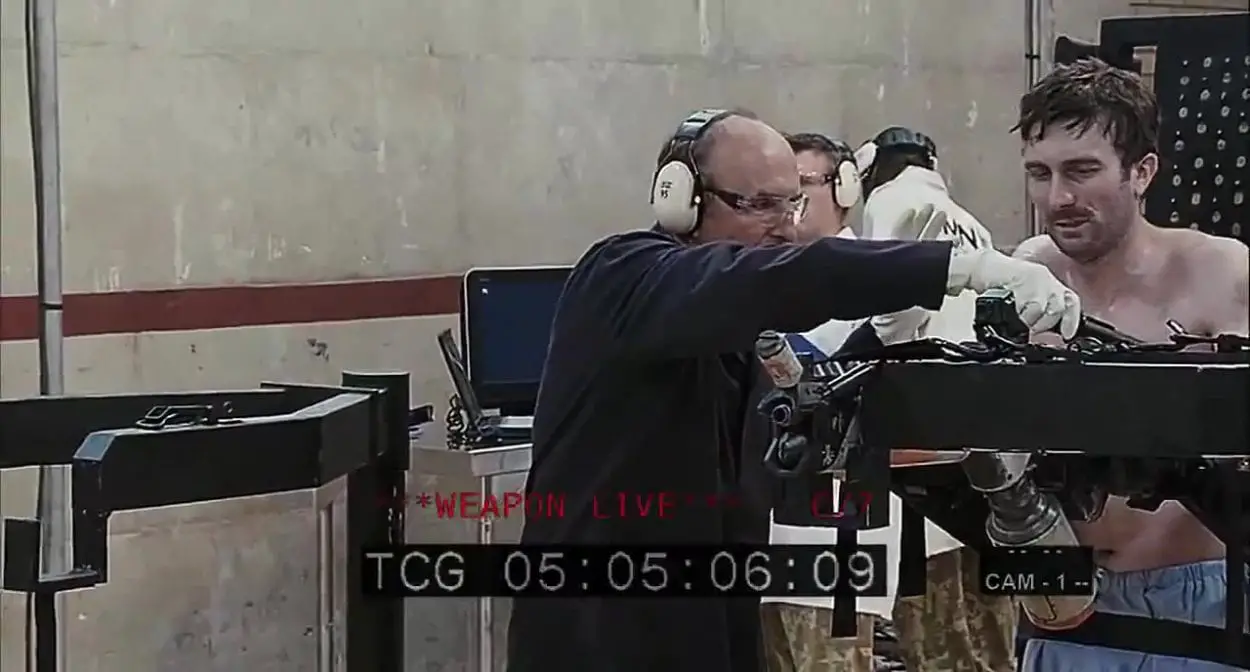In 2009 Neill Blomkamp made his feature film debut and absolutely wowed the cinematic world with his alien-centric take on apartheid South Africa. District 9 focuses on the alien residents of the titular township that lay on the outskirts of the modern-day Johannesburg. The inhabitants of this township arrived two decades before on a mother ship that now lay dormant, hovering in the sky above the South African cityscape. After a plague of some sort decimated the leaders, the alien population has been left rudderless, to live in squalor in a slum, surrounded by violence and crime, a far cry from the interstellar beings they once were.
Blomkamp is known for only ever hiding his real intentions beneath a thin veil. District 9 was his first showing of this habit of his. The treatment the aliens have had to endure and the station in life they find themselves in is a clear metaphor for the state of the black African population of South Africa and how they have been treated throughout the bloody history of the nation. The brutal actions that have taken place throughout many South African townships are what gave Blomkamp the inspiration to tell this story.
The way the aliens are—for lack of a better word— dehumanized is what many innocent black people had to suffer during the harsh apartheid period. They were targeted for being different and seen as less than, this is the very same way the aliens are viewed by the broader South African community in District 9. They see them as a nuisance, that does not have the same rights that they do, viewing them as nothing more than bottom-feeding vermin. They are very upfront with this, calling them prawns, a clear nod to the racial slurs that are often hurled at minorities for nothing more than the fact that it makes small people feel big for a moment.
Although the main inspiration for District 9 is apartheid-era South Africa, there is another seam than runs through its narrative. That seam is the story of the refugee, and the obstacles they face in trying to integrate into a society that does not even want them there in the first place. They seek to find their place, a home but are often faced with an insurmountable amount of vile hatred and wholly unwarranted cruelty. The cruelty that I mention more often than not takes the form of barbaric violence, human trafficking, and the poorest of the poor being ripped off financially, left destitute with nothing but the worst kinds of choices to make in order to stay alive.
These circumstances could be owed to the lack of leadership, that lay within the ranks of the alien race. It makes me wonder if this is what Blomkamp felt when he was growing up, that too often there was a group of people that were oppressed and lacked the leadership to help them change their situation. That infighting took the place of cooperation, that if only they could unite that they could make their situation better. The only slight ray of leadership light comes in the shape of the alien named Christoper Johnson; the renaming of which can be seen as more commentary on forced integration.
This alien is to use Wikus’ words is a little sharper than the rest. He understands that the treatment and constant interference from the private corporation MNU into the townships as not only unacceptable but also wholly unlawful. The multinational entity has been appointed by the South African government to go in and enact a 24-hour notice of eviction on the residents of the derelict district. The methods that are deployed by MNU are callous, cold-hearted tactics, to once again steal a line from Wikus they shoot first and look for answers later.

Instead of seeing armed intervention as a last resort, these mercenaries see it as the only resort. They don’t value the lives of the alien species, they don’t see a sentient life before them, all they see is different, and to them, different is an abomination that needs to be eradicated. They see any alteration in their world view as an assault on them as a person, they see it as a forced change, not understanding that they are the ones forcing the change in these poor refugees and not the other way around. The assault they feel is an imagined one, and the enemies they manifest are just that, manifestations of their own mind.
Even though the reason for their hate is concocted within themselves, the ramifications of this hatred are felt wholeheartedly in the real world. This hatred is seen on full display when the MNU forces begin to clear out the district. The process and protocols they adhere to can be seen as a parallel to the removal of the Native Americans from their tribal lands and onto the horrid conditions of the reservations. They are shuffled off into an area deemed more appropriate not because of some wrong they committed but because they are seen as an inconvenience that has outstayed their welcome.
The treatment and tactics of oppression run deep within District 9’s story. The enforcers are MNU, this is where Blomkamp focuses on the militarization and privatization of the police, which is something he would more keenly concentrate on in Chappie but it is also rife within District 9. The use of tanks and armored vehicles has become more and more prevalent from civil police forces. It also shows us that when a private police force is deployed, there is an immediate disconnect between them and the ones they are policing.
When in service of a corporation instead of a nation, the lines between what is easy and what is right can become blurry very quickly. They prefer expedience over ethnicity, aggressiveness in place of progressiveness, using propaganda to force-feed their agenda, which is something that is not unique to cooperations, but it is a tactic they use nonetheless. Just like the Nazis lying to the Jews about the concentration camps or the American government to the Native Americans about the reservations, MNU creates a false narrative around the alien’s destination District 10. Wikus says as much, comparing the refugee camp to being nothing more than one of the Nazi death camps.

When you look through the layers of District 9, it is so mightly impressive how much Blomkamp was able to contain within its narrative. He constructed a world that seems so different but at the same time so recognizable. The reason the story he brings to life really resonates is that amongst all of the political undertones and alien life forms, Blomkamp manages to tell a real human story. The story I speak of is that of the protagonist of District 9, Wikus Van De Merwe (Sharlto Copley.) The journey Wikus takes from MNU bureaucratic lackey to public enemy number one and onto borderline freedom fighter is every bit as moving as it is epic.
The poor bumbling Wikus stumbles his way into an earth-shattering situation. It is something that we can all imagine; we too can put ourselves in Wikus’ place. He is not some over the top action hero; he is a real person, with real wants and needs. He loves his wife, wants nothing more than to impress his father in law and make a good impression in his job after being promoted. This promotion sees him lead the charge into District 9, where he will come in contact with the alien liquid that begins his mutation.
It is because of this incident, Wikus is allowed a real insight into the alien experience. He is forced to walk a mile in the shoes of the ones that he had also help to oppress. When his mutation is discovered, the curtain to the world of District 9 is pulled back to reveal the real atrocities that are taking place within the walls of MNU. Wikus is subjected to invasive medical tests, cruel weapons tests and is even made to execute an alien. These experimentations harken back again to what the Nazis did to untold amounts of poor innocent Jewish people and other minorities throughout World War 2.

Now that Wikus sees it for himself, this is when he realizes how wrong his actions were and how callous the treatment of the aliens really is. This is what is at the crux of District 9’s story, that to know what the other side of the coin is then we too have to try and experience what that way of life is really like. We can never really know in the way Wikus finds out, the change for him is not only physical but what it leads to is a mental transformation. Wikus’ world view changes, he understands the true value of life, that in all forms it takes it is precious.
That even though this other race seems so completely alien to him at first, deep down they are very much the same. Just like us, they too feel love, want to live free and happy. That any perceived difference was only skin deep, that when given the ability to see beneath the surface you don’t see differences you see strikingly familiar similarities. This is what Wikus finds out and it is a message that should resonate with all of us, that understanding has to take the place of fear. That different peoples and species, in this case, can co-exist and that for one to live that does not mean the other has to suffer.
The climax of District 9 shows us this change in Wikus. When he is in the alien exo-suit he goes running away, abandoning Christopher Johnson, but then he turns back, this is the moment Wikus finally understands the value of life, not just his own but all life. He realizes that he must make the sacrifice play, which is a huge turning point for Wikus. Now just like us, he comes to understand that he must make a stand to prevent cruelty in this world, even if that means laying it all on the line, which is something that should hit home for all of us.



